- Home
- Michael Chabon
Telegraph Avenue Page 3
Telegraph Avenue Read online
Page 3
His voice as he made this observation, like his expression as he took it all in, sounded unhappy to Mr. Nostalgia, even forlorn. Not the disdain that Mr. Nostalgia’s wife always showed for his stock-in-trade but something more like disappointment.
“Used to be pretty standard for a hit show,” Mr. Nostalgia said, wondering when Stallings would get around to hitting him up for the forty-five dollars. “Nothing much of interest in that set.”
Though Mr. Nostalgia loved the things he sold, he had no illusion that they held any intrinsic value. They were worth only what you would pay for them; what small piece of everything you had ever lost that, you might come to believe, they would restore to you. Their value was indexed only to the sense of personal completeness, perfection of the soul, that would flood you when, at last, you filled the last gap on your checklist. But Mr. Nostalgia had never seen his nonsports cards so sharply disappoint a man.
“ALF, yeah, I remember that one,” Stallings said. “That’s real nice. Growing Pains, Mork & Mindy, uh-huh. Where the Masters of Kung Fu at?”
Mr. Nostalgia went around to a bin he had tucked under the table that morning after setting up and dug around inside of it. After a minute of moving things around in the bin, he came out with the partial set, the one that was missing the Lee and the Norris cards. “Fifty-two cards in the set,” he said. “You’re number, I don’t know, twelve, I think it is.”
Stallings shuffled through the cards, whose imagery depicted, bordered by cartoon bamboo, labeled with takeout-menu-style fake Chinese lettering, a fairly indiscriminate mixture of real and fictitious practitioners (Takayuki Kubota, Shang-Chi) of a dozen forms of martial arts in addition to the eponymous one, including bartitsu (Sherlock Holmes) and savate (Count Baruzy). At last Stallings came up with his card. Stared at the picture, made a sound like a snort through his nose. The card featured a color still from one of his movies, poorly reproduced. A young Luther Stallings, in red kung fu pajamas, flew across the frame toward a line of Chinese swordsmen, feet first, almost horizontal.
“Damn,” Stallings said. “I don’t even remember what that’s from.”
“Take it,” Mr. Nostalgia said. “Take the whole set. It’s a present, from me to you, for all the pleasure your work has given me over the years.”
“How much you get for it?”
“Well, the set, like I said, it’s pretty tough. I’m asking five, but I’d probably take three. Might go for seven-fifty with the Bruce Lee, the Chuck Norris.”
“Chuck Norris? Yeah, I went up against the motherfucker. Three times.”
“No joke.”
“Kicked his ass all over Taipei.”
Mr. Nostalgia figured he could look it up later if he wanted to break some small, previously unbroken place in his own leaf-buried heart. “Go on,” he said. “It’s yours.”
“Yeah, hey, thanks. That’s really nice. But, uh, no offense, I’m already so, like, overburdened, you know what I’m saying, with stuff out of the past I’m carrying around.”
“Oh, no, sure—”
“I just hate to add to the pile.”
“I totally understand.”
“Got to keep mobile.”
“Of course.”
“Travel light.”
“Right-o.”
“How much,” Luther Stallings said, lowering his voice to a near-whisper. Swallowing, starting over, louder the second time. “How much you get for my card by itself.”
“Oh, uh,” Mr. Nostalgia said, understanding a microsecond or two too late to pull off the lie that he was going to have to tell it. “A hundred. Ninety, a hundred bucks.”
“No shit.”
“Like around ninety.”
“Uh-huh. Tell you what. You give me this one card, Luther Stallings in . . . I’m going to make a wild guess and say it was Enter the Panther.”
“Has to be.” Mr. Nostalgia felt the play begin again, the game that Luther Stallings was trying to run on him and, somehow, on Gibson Goode.
“And I’m a sign it, okay?” Here it came. “Then I’m a trade it back to you for forty-five bucks.”
“Okay,” Mr. Nostalgia said, feeling unaccountably saddened, crushed, by the pachyderm weight of a grief that encompassed him and Stallings and every man plying his lonely way in this hall through the molder and dust of the bins. The world of card shows had always felt like a kind of true fellowship to Mr. Nostalgia, a league of solitary men united in their pursuit of the lost glories of a vanished world. Now that vision struck him as pie in the sky at best and as falsehood at the very worst. The past was irretrievable, the league of lonely men a fiction, the pursuit of the past a doomed attempt to run a hustle on mortality.
“If that’s how you want it,” Mr. Nostalgia said. He was not averse, in principle, to raising the five-dollar value of the Stallings card by a factor of three or four. But as he handed Stallings the gold-filled Cross pen, a bar mitzvah gift from his grandparents that he liked to use when he was getting something signed for his own collection, he wished that he had never come out from behind the table, had let the security guards sweep Luther Stallings past Mr. Nostalgia’s Neighborhood and clear on out of the Kaiser Center.
Over the course of the next half hour, he checked on Stallings a couple of times as the man made his way to the end of the signing line for Gibson Goode, then inched his way to the front one lonely man at a time. In the middle of selling a 1936 Wolverine gum card, “The Fight with the Shark,” for $550 to a dentist from Danville, Mr. Nostalgia happened to glance over and see that Luther Stallings had regained his place at the front. The bodyguard got to his feet looking ready, as promised, to suspend mercy, but after a brownout of his smile, Gibson Goode reached for the bodyguard and gently stiff-armed him, palm to the big man’s chest, and the big man, with a mighty headshake, stepped off. Words passed between Goode and Stallings—quietly, without agitation. To Mr. Nostalgia, reading lips and gestures, sometimes able to pick up a word, a phrase, the conversation seemed to boil down to Gibson Goode saying no repeatedly, with blank politesse, while Luther Stallings tried to come up with new ways of getting Goode to say yes.
There was only so much of this that the people in line behind Luther Stallings were willing to put up with. A rumor of Stallings’s earlier outburst, his near-ejection, began to circulate among them. There was a certain amount of moaning and kvetching. Somebody gave voice to the collective desire for Stallings to Come on!
Stallings ignored it all. “You asked him?” he said, raising his voice as he had done an hour ago, when the blue blazers came to see how he might like to try getting himself tossed. “You asked him about Popcorn?” Talking loudly enough for Mr. Nostalgia and everybody in the neighborhood to hear. “Then I got the man for you. Hooked him. You know I did.”
The expressions of impatience, general down the line, rose to outright jeering. Stallings turned on the crowd, trying to scowl them into silence, snapping at a man in a Hawaiian shirt standing two guys behind him. The man said, “No, fuck you!”
Wading into the signing area, arms windmilling to reach for Stallings in a kind of freestyle of aggression, came the two blue blazers, Shaved Ball and the Soviet. They took brusque hold of Stallings’s arms, faces compressed as if to resist a stink, and jerked his arms back and toward his spine.
Two seconds later, no more, Shaved Ball and the Soviet were lying flat on their backs on the painted cement floor of the hall. Mr. Nostalgia could not have said for certain which of them had taken the kick to the head, which the punch to the abdomen, or if Luther Stallings had even moved very much at all. As they’d gone tumbling backward, the line of autograph seekers had shuddered, rippled. Human turbulence troubled all the surrounding lines, people waiting for Chris Mullin, Shawn Green.
“Bitch,” Stallings said, turning back to Gibson Goode, in his polo shirt, with his sockless loafers. “I want my twenty-five grand!”
Gibson Goode, being Gibson Goode, Mr. Nostalgia supposed, might have had no choice in the matter: He kep
t, as his legend said he must, his cool. The same quiet, restraining hand against his bodyguard’s chest. Unintimidated. Still smiling. He took out his wallet, opened it, and counted out ten bills, rapid-fire. Slid them across the signing table. Luther Stallings studied them, head down, chest rising and falling. The money lay there, exciting comment in the line, ten duplicate cards from the highly collectable Dead Presidents series. Luther shook his head once. Then he reached down and took the money. Resigned—long since resigned, Mr. Nostalgia thought—to doing things he knew he was going to regret. When he went past Mr. Nostalgia’s table, without so much as a thank-you, he had not managed to get his chin up again.
It was only later, as a voice on the PA was chasing stragglers from the hall and the lights went out over the signing area, that Mr. Nostalgia noticed Luther Stallings had walked off with his gold pen.
On a Saturday night in August 1973, outside the Bit o’ Honey Lounge, a crocodile-green ’70 Toronado sat purring its crocodile purr. Its chrome grin stretched beguiling and wide as the western horizon.
“Define ‘toronado,’ ” said the man riding shotgun.
Behind his heavy-rimmed glasses, he had sleepy eyes, but he scorned sleep and frowned upon the somnolence of others. In defiance of political fashion, he greased his long hair, and its undulant luster was clear-coat deep. His name was Chandler Bankwell Flowers III. His grandfather, father, and uncles were all morticians, men of sobriety and pomp, and he inhabited a floating yet permanent zone of rebellion against them. Nineteen months aboard the Bon Homme Richard had left Chan Flowers with an amphetamine habit and a tattoo of Tuffy the Ghost on the inside of his left forearm. The shotgun, holstered in a plastic trash bag alongside his right leg, was a pump-action Mossberg 500.
“ ‘Define’ it?” said the driver, Luther Stallings, not giving the matter his full attention. His eyes, green flecked with gold, kept finding excuses to visit the rearview mirror. “It’s the name of a car.”
“But what does it mean? What is the definition of the word ‘toronado.’ Tell me that.”
“You tell me,” Luther said, more wary now.
“It’s a question.”
“Yeah, but what are you really asking?”
“Toro-nah-do.” Chan strumming the “R” like a string of Ricky Ricardo’s guitar. “You’re driving it. Talking about it. In love with it. Don’t even know what it means.”
Luther massaged the leather cover on the steering wheel as if feeling for a cyst. He took another glance in the mirror, then leaned forward to look past Chan at the Bit o’ Honey’s front door. Where Chan ran to dark and stocky, Luther Stallings was long and light-skinned, with an astronaut chin. He had served one tour in the U.S. Army, most of it spent splintering planks with his feet for a hand-to-hand combat demonstration team. He was dressed as for dancing, tight plaid bell-bottom slacks, a short-sleeved terry pullover. His hair rose freshly stoked into a momentous Afro.
“I believe it is Spanish,” Luther said. “A common expression, can be loosely translated to ‘suck my dick.’ ”
“Vulgar language,” Chan said, drawing on his rich patrimony of improving maxims. That stiff mortuary grammar, hand-beaten into him by his old man, had always embarrassed him when they were youngsters. In this hoodlum revolutionary phase he was going through, Chan flaunted the properness of his speech, a lily in the lapel of a black leather car coat. “Always the first and last refuge of the man with nothing to say.”
Luther broke free of the mirror to look at Chan. “Toronado,” he said, employing the imperative.
“You don’t know, do you?” Chan said. “Just admit. You are driving around, you paid three thousand dollars for this vehicle, cash, for all you know, a toronado’s, what, might be some kind of brush you use for cleaning a Mexican toilet bowl.”
“I don’t care what it—”
“Juanita, quick, get the toronado, I have diarrhea—”
“It means a bullfighter!” Luther said, rising to the bait despite long experience, despite needing to keep one eye on the rearview and one on the diamond-tufted vinyl door of the lounge, in spite of wanting to be a hundred years and a thousand miles away from this place and this night. “A fighter of bulls.”
“In Spanish,” Chan suggested in a mock-helpful tone.
Luther shrugged. When Chan was nervous, he got bored, and when he got bored, he would start trouble, any kind of trouble, just to break the tedium. But there was more to this line of questioning. Chan was mad at Luther and trying to hide it. Had been trying for days to hold his anger close, like the Spartan boy with the fox in his shirt, let it feast on his intestines rather than cop to hiding it.
“ ‘Bullfighter,’ ” Chan said with bitter precision, “is torero.”
He bent down to scoop a handful of twelve-gauge cartridges from a box between his feet and pocketed them at the hip of his tweed blazer. His hair, heavy with pomade, gave off a dismaying odor of flowers left too long in a vase, putrid as envy itself.
“Then uh, ‘tornado,’ ” Luther tried.
This was such a contemptible suggestion that Chan, who generally never lacked for verbal expressions of contempt, could dignify it only with a smirking shake of his head. Luther was about to point out that it was he, the ignorant one, who’d just laid down thirty-two hundred-dollar bills for the beautiful car with the mysterious name, while Professor Flowers remained a frequent denizen of the buses.
“Chan, you captious motherfucker—” he began, but then stopped.
From another pocket of his tweed blazer, patches on the elbows, Chan drew a pair of sateen gloves, dark purplish blue. Shoddy things, busted at the seams, tricked out with pointy fish fins. Last Halloween, Chan’s little brother, Marcel, out trick-or-treating in a Batman suit, had been hit by a car and killed. Drunken negroes in a Rambler American, boy stepping off the curb with his face too small to really fit the eyeholes of the mask. Chan had some tiny hands, but even so, the gloves were a tight fit, and as he pulled them on, they split some more.
When Luther saw Chan wearing Marcel’s purple crime-fighting gloves, he didn’t know what to say. He threw another glance at the rearview: Telegraph Avenue nocturne, a submarine wobble of light and shadow. Chan reached into the garbage bag, came out with a bat-eared mask stamped from flimsy plastic. He slipped the elastic string over the back of his head, parked the borrowed face at the top of his forehead.
“Okay,” Luther said at last, the second smartest boy in the room every day of his life from 1955 to the day in 1971 that had Chan shipped out, “tell me what it means.”
A girl, at key points also constructed like the car along a beguiling x axis, came out of the Bit o’ Honey Lounge. She wore tight white jeans whose flared legs bellied like sails. Her hair was tied back shiny against her head to emerge aft in a big puffball. Her feet rode the howdahs of swaying platform sandals. As she sauntered past the car, she pulled the tails of her short-sleeved madras shirt from the waist of her jeans, knotting them together under her breasts.
“That’s it,” Luther said. He pressed down on the clutch and readied his hand on the gearshift. “Go if you’re going.”
Chan lowered the mask over his face, and Luther saw that it had been painted top to bottom, matte black paint effacing the line that marked the bottom edge of Batman’s cowl, paint sprayed over the heroic molded chin dimple, the affable molded smile. Behind the mask, Chan’s eyes glistened like organs exposed by two incisions.
“Jungle action,” Chan said behind the baffle of the mask. “Oh, and by the way.” He shouldered open the passenger door and sprang out of the car. The shotgun in the garbage bag hung by his side like a workaday implement. “ ‘Toronado’ doesn’t mean shit.”
Chan’s right arm snaked into the mouth of the garbage bag as, with his left hand, he grabbed hold of the brass handle of the upholstered front door of the club. He yanked the door open, flinging his right arm out to the side. The garbage bag flew off, revealing the riot gun that Chan had checked out that afternoon from the ba
sement arsenal of a Panther safe house in East Oakland. There was a gust of horns, palaver, and thump, and then the door breathed shut behind Chan. The garbage bag caught on a thermal hook and spun in the air, teased and tugged by unseen hands.
Luther lowered the volume on the in-dash eight-track. City silence, the sigh of a distant bus, the tide of the interstate, Grover Washington, Jr., setting faint, intricate fires up and down the length of “Trouble Man.” Beyond that, nothing. Luther felt his attention beginning not so much to wander as to migrate, seeking opportunity elsewhere. Far down the coast highway, at the wheel of his beautiful green muscle car, he made his way to Los Angeles, capital of the rest of his life. In a helicopter shot, he watched himself rolling across an arcaded bridge with the ocean and the dawn and the last of the night spread out all around him.
He heard the stuttering crack of a number of firearms discharging at once. The door of the Bit o’ Honey banged open again, spraying horns and shouts. Chan came out at a running walk. He got into the car and slammed the door. Blood streaked his left shoe like a bright feather. The shotgun gave off its sweet, hellish smell, electricity and sizzling fatback.
Luther shifted into first gear, standing on the gas pedal, balanced on it, and on the moment like the trumpeter angel you saw from the Warren Freeway, perched at the tip of the Mormon temple, riding the wild spin of the world itself. Everything Detroit could muster in the way of snarling poured from the 450 engine. They parlayed a dizzying string of green lights all the way to Claremont Avenue. It had been a case of love at first sight for Luther and the Toronado two days before, at a used-car lot down on Broadway. Now, as they tore up Telegraph, something slid coiling through his belly, more like a qualm of lust. Chan tossed his brother’s Halloween mask out of the open window, slid the gun under the seat. He peeled away the gloves and started to throw them out, too, but in the end seemed to want to hold on to them, the right one bloody and powder-burned, a while longer. He sat there clutching them in one fist like a duelist looking for someone to slap.
At the Claremont intersection, with no one after them and no sign of the law, Luther eased the car into a red light. Just an ordinary motorist, window down, elbow hooked over the door, grooving on the passage of another summer evening. Somewhere in the vicinity, he had once been told, covered over by time and concrete, lay the founding patch of human business in this corner of the world. Miwok Indians dreaming the dream, living fat as bears, piling up their oyster shells, oblivious to history with its oncoming parade of motherfuckers.

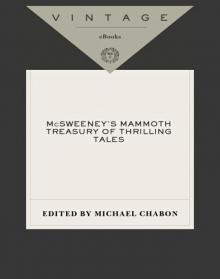 McSweeney's Mammoth Treasury of Thrilling Tales
McSweeney's Mammoth Treasury of Thrilling Tales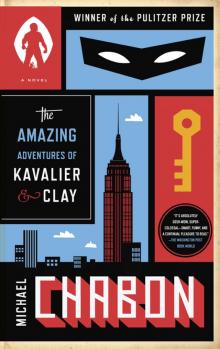 The Amazing Adventures of Kavalier & Clay
The Amazing Adventures of Kavalier & Clay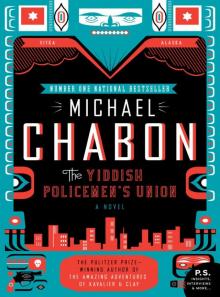 The Yiddish Policemen's Union
The Yiddish Policemen's Union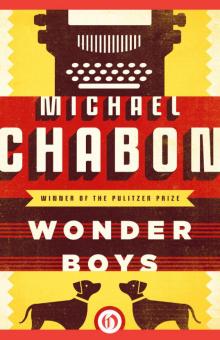 Wonder Boys
Wonder Boys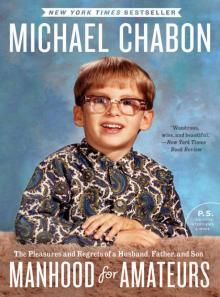 Manhood for Amateurs
Manhood for Amateurs Kingdom of Olives and Ash: Writers Confront the Occupation
Kingdom of Olives and Ash: Writers Confront the Occupation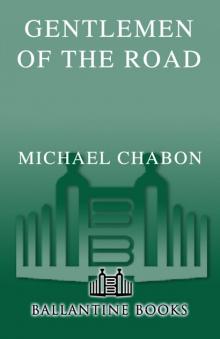 Gentlemen of the Road: A Tale of Adventure
Gentlemen of the Road: A Tale of Adventure A Model World and Other Stories
A Model World and Other Stories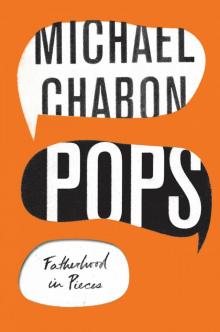 Pops: Fatherhood in Pieces
Pops: Fatherhood in Pieces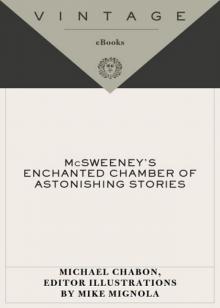 McSweeney's Enchanted Chamber of Astonishing Stories
McSweeney's Enchanted Chamber of Astonishing Stories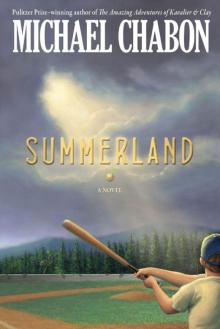 Summerland
Summerland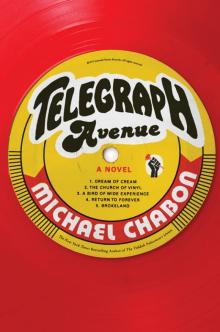 Telegraph Avenue
Telegraph Avenue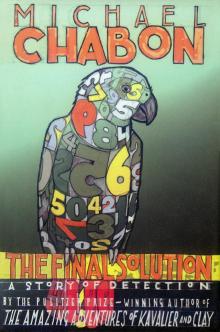 The Final Solution
The Final Solution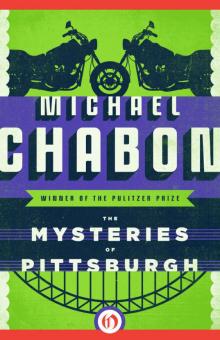 The Mysteries of Pittsburgh
The Mysteries of Pittsburgh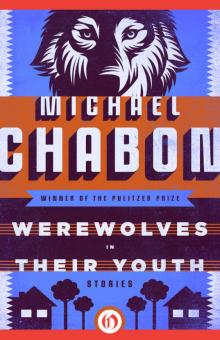 Werewolves in Their Youth
Werewolves in Their Youth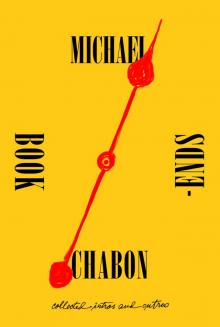 Bookends
Bookends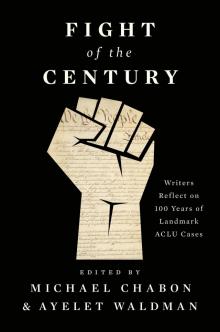 Fight of the Century
Fight of the Century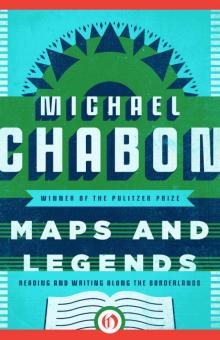 Maps and Legends
Maps and Legends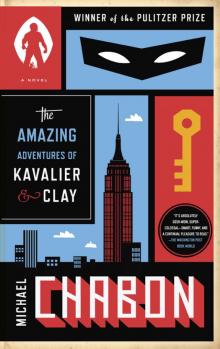 The Amazing Adventures of Kavalier & Clay (with bonus content)
The Amazing Adventures of Kavalier & Clay (with bonus content) Kingdom of Olives and Ash
Kingdom of Olives and Ash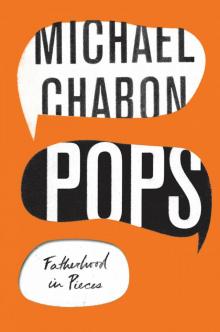 Pops
Pops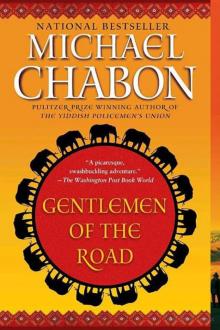 Gentlemen of the Road
Gentlemen of the Road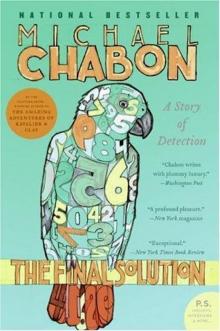 The Final Solution: A Story of Detection
The Final Solution: A Story of Detection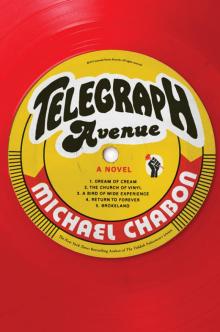 Telegraph Avenue: A Novel
Telegraph Avenue: A Novel